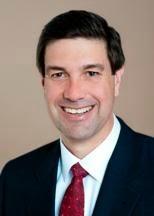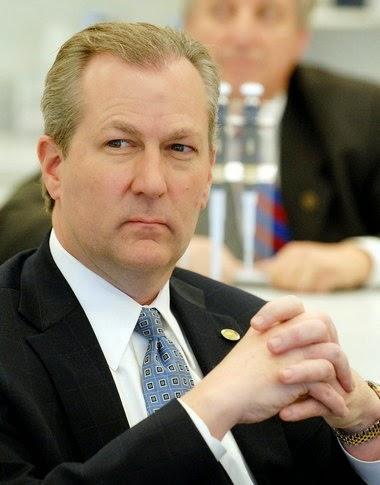
Rob Riley
Many Alabamians probably are still trying to pick their jaws off the floor following reports Friday about evidence in the prosecution of House Speaker Mike Hubbard (R-Auburn). The material includes Hubbard e-mails--many of them to and from former Governor Bob Riley--that spotlight the speaker's financial woes, his whiny demeanor, and his utter disregard for the rights and feelings of others.A report from John Archibald, of al.com, carried an appropriate headline: "Stunning e-mails paint Alabama House Speaker Mike Hubbard as desperate for money, favors." The conservative news outlet found Hubbard's words so embarrassing that it followed up with an editorial calling for his resignation. From the editorial: "His own emails show [Hubbard] to be venal and grasping and unconcerned with boundaries between public business and his private interests."
The worst for Hubbard might still be out there. According to the state's response to Hubbard's Motion for a More Definite Statement, it turned over more than 2.5 million pages of documents on February 17, 2015, outlining the case against the speaker. That apparently means the documents made public last Friday are a small sampling of the material gathered against Hubbard. What other embarrassing and illuminating documents might become known at trial?
All of this, plus another recent news article that received relatively little attention, raise this question: Was my unlawful arrest and incarceration somehow connected to the grand-jury investigation of Hubbard and others in Lee County? Let's follow the evidence that we have so far:
Former Deputy Attorney General Sonny Reagan retained lawyers Rob Riley and Bill Baxley in fall 2013, according to a recent report at Alabama Political Reporter (APR). What else happened in fall 2013? I was arrested and spent five months in the Shelby County Jail on the heels of defamation lawsuits filed by . . . Rob Riley and Bill Baxley.
Is all of this somehow connected? Since I was released on March 26, 2014, several knowledgeable individuals have told me they believe my incarceration was connected to the ongoing grand-jury investigation in Lee County, Alabama. I've never been sure about that, but the new report from APR's Bill Britt shows that Riley, Baxley, and Reagan were joining forces at pretty much the same time of my arrest.
Was my incarceration designed to ensure I was not available to report on news that might come out of Lee County? Were Rob Riley, Bill Baxley, Mike Hubbard, and others concerned that my sources would provide damaging information about the Riley political machine? I'm starting to think the answer might be yes--although I doubt the Lee County probe was the only motivating factor.
We do know this for sure: Rob Riley's lawsuit led directly to my incarceration, and his case bears little or no resemblance to a normal defamation complaint--in fact, it repeatedly seeks remedies that are not sanctioned by law. That strongly suggests an ulterior motive was in play.
How might all of this fit together? Well, it's complicated. Hubbard, the primary target of the Lee County investigation, has been indicted on 23 criminal counts--and Britt reports that Riley long has represented Hubbard. Reagan testified before the grand jury and wound up being forced to resign from the Attorney General's Office following charges that he leaked information to possible targets of the investigation. To whom did he leak the information? We do not know.
But thanks to Britt's reporting, we know Reagan must have smelled trouble brewing for quite some time because he retained Baxley and Riley as far back as fall 2013. Let's follow this curious timeline:

Mike Hubbard
According to published reports, the Lee County grand jury convened in August 2013 and started calling witnesses in October of that year. When was I arrested? That came on October 23, 2013--supposedly because I violated a preliminary injunction in Riley's defamation lawsuit. Never mind that more than 200 years of First Amendment law says such an injunction in a case of alleged defamation represents an unlawful prior restraint. Never mind that even right-wing legal analysts, such as Ken White at the Popehat blog, have written that my arrest was wildly unlawful and contrary to long-settled First Amendment law.We already have pointed to evidence that Riley's lawsuit was not really about defamation. From a post dated October 7, 2014:
Let's consider a few elements of Riley's claim--and contrast them with actual defamation law:
* Riley immediately asked for a temporary restraining order (TRO), followed by a preliminary injunction--A long line of state and U.S. Supreme Court cases show that TRO's and preliminary injunctions are barred as unconstitutional prior restraints in defamation cases. One of the most recent examples is a Virginia case styled Dietz v. Perez, which involved a woman writing a negative review about a construction contractor on a couple of Web forums. The foundational case on the subject is a 1931 U.S. Supreme Court case styled Near v. Minnesota, which was built on roughly 200 years of First Amendment law.
* Riley did not ask for a trial--Longstanding law holds that an injunction in a defamation case is proper only after a full adjudication on the merits, at trial. This principle is spelled out in a 1973 U.S. Supreme Court case styled Pittsburgh Press Co. v. Pittsburgh Commission on Human Relations, 413 U.S. 376. It is discussed in more full detail in a 2007 California case styled Balboa Island Village Inn v. Lemen, 156 P.3d 339 (Cal. 2007).
* Riley asked for a judge to rule on the case, not a jury--The law holds that the First Amendment enjoys an exalted place in our democracy, and such cases are to be decided by a jury. To allow bench trials on such matters is to invite censorship by a single judge. Juries are deemed necessary to protect the cherished right to free speech. This principle is perhaps best discussed in Bernard v. Gulf Oil Co., 619 F. 2d 459 (Fifth Circuit, 1980).
Rob Riley sought an unlawful TRO and preliminary injunction, he did not seek a trial, and he did not ask for a jury. All of this violates clear law, and indicates his lawsuit was really about something other than defamation. In fact, his case never even looked like a defamation claim.
The recent APR report tells us that Rob Riley's mind very much was on the Lee County investigation at the time he asked Judge Claud Neilson to order my arrest--a move that has zero support under the law. In essence, Rob Riley asked for me to be kidnapped--and he also asked for my wife to be kidnapped, even though she had nothing to do with my blog at the time.
Why would a major Republican political figure take such desperate and wildly unlawful steps? We don't have a definitive answer, but we do have other questions: Will Alabama Republicans start to drift away from Mike Hubbard in the wake of his embarrassing e-mails? Will Sonny Reagan face criminal charges and possible disbarment for leaking grand-jury information, along with those to whom he leaked?
If we get to that point, the Lee County story will really heat up--and the mask might get pulled off some of the bad actors who have turned Alabama into one of the nation's most corrupt states.
